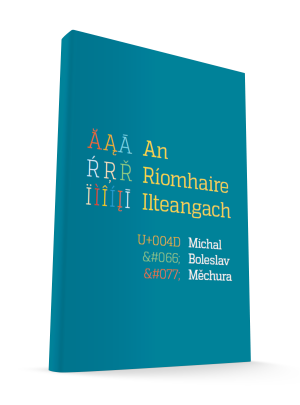
Foirmeacha gramadaí
Grammatical forms
Iontrálacha gaolmhara
Related entries
♦
tá sé de cheart ag [duine] [rud a dhéanamh]
♦
[somebody] has the right [to do something]
♦
tá sé de cheart agat dlíodóir a fháil
♦
you have the right to get a lawyer
♦
beidh de cheart ag an pharlaimint an buiséad a leasú
♦
the parliament will have the right to amend the budget
STAITISTICÍ · STATISTICS
Is é sé an
12ú focal
is minice úsáid sa Ghaeilge.
Tagann sé chun cinn uair amháin i ngach 116 focal.
Sé is the
12th
most frequently used word in Irish.
It occurs once in every 116 words.
Samplaí gaolmhara
Related examples
♦
shuigh sé síos chun litir a scríobh
♦
he sat down to write a letter
♦
seo an litir atá sé a scríobh
♦
this is the letter he is writing
♦
tá sé in am duit dul abhaile
♦
it is time for you to go home
♦
oíche amháin mhothaigh sé go raibh sé á thachtadh agus thit sé ina chnap ar an urlár
♦
one night he felt he was choking and fell in a heap on the floor
♦
bhí sé ag breathnú ar an doras amhail is go bhféadfadh an t-áibhirseoir féin teacht isteach nóiméad ar bith Alex Hijmans: Aiséirí, Cois Life 2011
♦
he was looking at the door as if the devil himself could come in any minute
♦
tá sé coitianta go leor sa Ghearmáin, agus is annamh a gheofá abhus é
♦
it is common enough in Germany but you'd rarely get it here
♦
thaistil sé achar fada soir
♦
he travelled a long way to the east
♦
bhíodh sé in achrann leis na gardaí go minic
♦
he would often be in trouble with the police
♦
tá sé seo déanta as adhmad
♦
thaistil sé chun na hAfganastáine i 1999 agus ghlac le hiarratas pearsanta Osama Bin Laden go n-eagródh sé ionsaithe aeir i Meiriceá
♦
he travelled to Afganistan in 1999 and accepted Osama Bin Laden's personal request that he would organize air attacks on America
♦
bhí sé ag fanacht ag doras an tí
♦
he was waiting at the house door
♦
chaith sé seal i bPáras sular thug sé aghaidh ar Mheiriceá
♦
he spent some time in Paris before he headed to America
♦
d'aimsigh sé duine eile a raibh taithí eitilte aige
♦
he found another person who had flying experience
♦
bhí sé ina shaighdiúir aimsir an chogaidh
♦
he was a soldier during the war
♦
tá sé in am aire nua a cheapadh
♦
it is time to appoint a new minister
♦
bhí sé san ospidéal, ach tá sé ar ais sa bhaile anois
♦
he was in hospital but he is back at home now
♦
tá sé fíordheas a bheith ar ais
♦
it is really nice to be back
♦
tá sé áisiúil bheith i do chónaí i lár na cathrach
♦
it's convenient to live in the city centre
♦
chuir sé a bhean chéile nua in aithne dúinn
♦
he introduced his new wife to us
♦
ní cuimhin liom gach pioc den scéal ach is cuimhin liom gur inis sé go hálainn é Alan Titley: Gluaiseacht, An Gúm, 2009
♦
I don't remember all the details of the story but I do remember that he told it beautifully
♦
beidh sé ag cur báistí amárach
♦
Is iad na Polannaigh an dream is mó inimirce go hÉirinn. Tá sé sin amhlaidh toisc a mhéad atá daonra na Polainne.
♦
The Polish are the most numerous immigant group to Ireland. This is so because of the high population of Poland.
♦
tá sé ag teacht anall as Sasana
♦
he is coming over from England
♦
tá sé ag teacht anuas ón stáitse
♦
he's coming down from the stage
♦
ba cheart go mbeadh sé sa bhaile anois nó d'fhág sé an teach seo uair an chloig ó shin
♦
he should be home by now for he left this house an hour ago
♦
ba chóir go mbeadh sé sa bhaile anois nó d'fhág sé an teach seo uair an chloig ó shin
♦
he should be home by now for he left this house an hour ago
♦
bhagair sé go dtarraingeodh sé a pháirtí amach as an rialtas
♦
he threatened that he would pull his party out of government
♦
bhagair sé díoltas ar an rí
♦
he threatened the king with revenge
♦
bhí sé ina oíche nuair a bhain mé an baile amach
♦
it was night when I reached home
♦
bhain sé an pictiúr den bhalla
♦
he took the picture off the wall
♦
it doesn't concern you, it isn't your business
♦
ní bhaineann sé sin le hábhar
♦
thug sé barróg dom a bhí lán de chroí
♦
he gave me a heartfelt hug
♦
tá sé ag saothrú an bháis
♦
he is in the throes of death
♦
chuir sé a lámh ar bhéalóg an ghutháin
♦
he covered the receiver with his hand
♦
chuir sé béalóg ar an mhadra
♦
he put a muzzle on the dog
♦
bhí sé ina sheasamh ag an bheár
♦
he was standing at the bar
♦
d'fhéadfadh an beart a bheith críochnaithe faoi cheann sé bliana
♦
the plan could be finished in six years
♦
tá sé beartaithe agam filleadh ar an ollscoil
♦
I am planning to return to university
♦
thógfar é díreach mar atá sé beartaithe
♦
it will be built exactly as planned
♦
it will be windy tomorrow
♦
tá sé ar an bhuachaill is cliste sa rang
♦
he is the cleverest boy in the class
♦
ar imeacht dó dúirt Fionn go mbeadh sé ar ais
♦
when he was leaving, Fionn said he would be back
♦
glacfaidh sé sé bliana ar a laghad
♦
it will take at least six years
♦
an bhfuil sé i gceist agat leanúint ar aghaidh?
♦
beidh sé ar fáil ar an Idirlíon
♦
it will be available on the Internet
♦
ní don chistin amháin é seo, ar ndóigh, ach bheadh sé úsáideach ann
♦
this is not just for the kitchen, of course, but it would be useful there
♦
thóg sé scian amach as a phóca
♦
he took a knife out of his pocket
♦
tháinig sé agus leabhar faoina ascaill aige
♦
he arrived with a book under his arm
♦
níl sé ach dhá bhliain d’aois
♦
tá sé mídhleathach an bogearra seo a chóipeáil
♦
it is illegal to copy this computer programme
♦
braitheann sé sin ar go leor rudaí
♦
that depends on a lot of things
♦
tá sé ag bun an leathanaigh
♦
it is at the bottom of the page
♦
cá fhad a thógfaidh sé orthu?
♦
how long will it take them?
♦
tharla sé sin san am atá caite
♦
it happened in past times
♦
chaith sé bríce leis na póilíní
♦
he threw a brick at the police
♦
tá sé seo níos casta ná mar a cheap mé
♦
this is more complicated than I thought
♦
cé chomh fada atá sé?
cé chomh fada is atá sé?
♦
cé chomh mór a bhí sé?
cé chomh mór is a bhí sé?
♦
cé chomh minic a thagann sé?
cé chomh minic is a thagann sé?
♦
ceannaíonn sé nuachtán gach maidin
♦
he buys a newspaper every morning
♦
ceapaim go bhfuil sé go hiontach
♦
tá sé chóir a bheith trí bliana d'aois
♦
he is almost tree years old
♦
tá sé ceartaithe agam ar an suíomh Gréasáin chomh maith
♦
I have corrected it on the website as well
♦
tháinig sé chun na tíre i Meitheamh 1922
♦
he came to the country in June 1922
♦
cibé duine a rinne é, íocfaidh sé as
♦
whoever did it, he will pay for it
♦
tá sé geall le cinnte go mbeidh moill orainn
♦
it is almost certain that we will be late
♦
tá sé fuar inniu - tá, cinnte
♦
it is cold today - it is, certainly
♦
tá sé go deas cloisteáil uait arís
♦
it is nice to hear from you again
♦
bhí sé deacair síocháin a choimeád i sochaí scoilte Thuaisceart na hÉireann
♦
it was difficult to maintain peace in the divided society of Northern Ireland
♦
glac sé col leo ar an toirt
♦
he disliked them immediately
♦
bhain sé le cúrsaí collaíochta
♦
tá sé ag obair le comhlacht Meiriceánach
♦
he's working for an American company

 Tá Gluais Tí Pota Focal faoi cheadúnas Creative Commons Attribution Non-Commercial Share-Alike agus ar fáil le híoslódáil anseo.
Pota Focal House Glossary is under the Creative Commons Attribution Non-Commercial Share-Alike licence and can be downloaded here.
Tá Gluais Tí Pota Focal faoi cheadúnas Creative Commons Attribution Non-Commercial Share-Alike agus ar fáil le híoslódáil anseo.
Pota Focal House Glossary is under the Creative Commons Attribution Non-Commercial Share-Alike licence and can be downloaded here.
 Tá inneachar an bhosca ‘Staitisticí’ bunaithe ar Liosta Minicíochta Focal Gaeilge atá faoi cheadúnas Open Database License.
The content of the ‘Statistics’ boxes is based on Irish Word Frequency List which are under the Open Database License.
Tá inneachar an bhosca ‘Staitisticí’ bunaithe ar Liosta Minicíochta Focal Gaeilge atá faoi cheadúnas Open Database License.
The content of the ‘Statistics’ boxes is based on Irish Word Frequency List which are under the Open Database License.
 Tá sonraí Ghluais Tí Pota Focal á n-úsáid in LingoBrain, cluiche foghlama focal le haghaidh na nguthán póca.
Data from Pota Focal House Glossary is used in LingoBrain, a vocabulary learning game for mobile phones.
Tá sonraí Ghluais Tí Pota Focal á n-úsáid in LingoBrain, cluiche foghlama focal le haghaidh na nguthán póca.
Data from Pota Focal House Glossary is used in LingoBrain, a vocabulary learning game for mobile phones.


